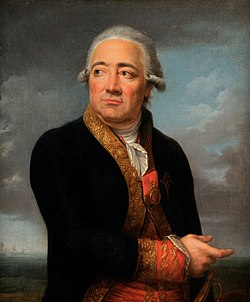Jose de Mazarredo y Salazar
| Vice-Admiral Don Joseph Mazarredo y Salazar | |
|---|---|
 
Portrait of Don José de Mazarredo by Jean François-Marie Bellie.
|
|
| Nickname(s) | El Bilbaíno |
| Born | 8 March 1745 Bilbao, Spain |
| Died | 29 July 1812 Madrid, Spain |
| Allegiance |
|
| Service/branch |
|
| Years of service | 1771–1805 |
| Rank | Admiral |
| Battles/wars |
|
Don Jose de Mazarredo y Salazar de Muñatones Cortázar Order of Santiago (Bilbao 1745 – Madrid, 1812) was a Spanish naval commander, cartographer, ambassador, astronomer and professor of naval tactics. He is considered to be one of the best Spanish naval commanders of all time.
His inclination toward the sea began at a young age; at 14 he enlisted himself aboard the sloop Andaluz. After 12 years of service in the Spanish navy, and by the good concept his superiors had to him, he was made assistant of the maritime department of Cartagena.
In 1772 Don Mazarredo went to the Philippines aboard the Frigate Venus, but in 1774 he was transferred to the frigate Rosalía and took part in a hydrographic campaign South America.
In 1775 he took part of the Spanish attack on Algiers. The plans of navigation, anchorage and disembarkation of the twenty thousand men of the Spanish army were made by him. Shortly after, Don Mazarredo developed a tabular system for the use of the Spanish Navy. In 1778, as commander of the ship of the line San Juan Bautista, he realised hydrographic surveys in the Iberian Peninsula, contributing to the creation of a Maritime Atlas.
Mazarredo was an original theorist. The Spanish Navy entered the American Revolutionary War with a system of tactics devised by him, Teniente de navío de la Real Armada, and expounded in Rudimentos de Táctica Naval para Instruction de los Officiales Subalternos de Marina, printed at Madrid in 1776, dedicated to King Charles III. Despite bearing some evidence of the influence of Paul Hoste and Sébastien Morogues, this is a text book for junior officers, though it could clearly have been read with profit by all alike. In common with the French writers, Mazarredo said very little about fighting the enemy. Broadly speaking, his tone was sophisticated and undogmatic.
...
Wikipedia
